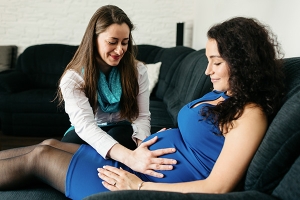
Recent news coverage of Bristol Palin’s pregnancy has people talking about teen pregnancy, but in fact unplanned pregnancy affects women of all ages and economic groups.
Angie Schneider and her husband have 4-year-old twins, and Angie is pregnant again at age 30—with twins. Both times, she conceived while on birth control, making both pregnancies totally unplanned—and unexpected. The couple struggles with money (he is an architect and she’s a communications consultant) and logistics, with childcare expenses and finding time to do all the laundry at the top of the list.
“It just seems so insane and impossible,” Angie says.
Lynn Morley and her stay-at-home husband had a 17-month-old and were shocked by a second pregnancy.
“We were using natural family planning; I was not on the pill because I was nursing,” Morley explains. “I cried and was afraid to tell my husband. I was heartbroken, angry and extremely scared. Neither of us began to embrace the pregnancy until the ultrasound at 20 weeks.”
Despite the fact that many couples carefully plan their pregnancies, and we all know those who methodically “try” to become pregnant, the reality is that about half of all pregnancies in the United States are unplanned, and 48 percent of women in the United States have an unplanned pregnancy at some point in their lives. Of course, some women may choose to terminate such pregnancies, but many others are not necessarily unwanted; they’re just unexpected, and as a result, they’re accompanied by a wide range of emotions, including shock, disbelief, anger, fear, panic, joy, excitement and resentment. These emotions come in any order and at any time, and all are valid and real, says Brad Imler, Ph.D., president of the American Pregnancy Association.
“I’m pretty sure I hit all the stages of grief,” Schneider recalls.
Many women even experience shame and embarrassment. Marisa Stevens had a 16-month-old son when she and her husband learned they were expecting again.
“I was actually a little embarrassed,” Stevens remembers. “You think of that as something that happens to teenagers, not college-educated, 27-year-old women.”
Imler suggests preparing yourself for questions—and answers—if other people learn your pregnancy was unplanned.
The confusing mix of emotions is normal.
“It doesn’t make you a bad mother to have conflicted feelings,” says Lara Honos-Webb, Ph.D., a psychologist specializing in pregnancy and motherhood. Low levels of stress are not dangerous for the baby, she says, so don’t worry that your mixed feelings are harming the baby. It’s not uncommon for moms in this situation to feel they are not bonding with their baby throughout the pregnancy, or to worry that they won’t bond after birth.
“Mothers should remember to not compare their attachment to the gold standard,” says Honos-Webb. To improve bonding, seek out a greater purpose and meaning in the entire situation and you will find you don’t blame the baby. “As a last resort,” she says, “ask your OB for a referral, as this could be a more serious depression.”
Helping Dad
Your partner’s reaction to the pregnancy is likely to span as many emotions as yours; however, he might have more trouble putting his feelings into words. Imler predicts that a man can get that “deer in the headlights” look and advises women not to assume that the reaction signals a lack of support.
“The mother will likely have to act as an emotion coach, helping him express what he is feeling,” says Honos-Webb. Men worry most about providing for the family and losing their partner to the commitments of motherhood. To reassure him, remind him that after about three months, the intense connection between mother and baby eases and you will be able to return more of your attention to him. When it comes to money, she suggests telling him “these are supposed to be the tough years and we have our whole lives ahead of us.”
Taking charge of
unexpected change
Coping with an unexpected pregnancy requires time and space.
“It isn’t something you wrap your head around overnight,” says Ann Douglas, author of The Mother of All Pregnancy Books. “You need to actively work through what you’re feeling. Talk to other couples who have gone through a surprise pregnancy. Find out what they did to get through the tough times.”
Imler agrees it is essential to develop and rely on a network of support to help you get through this.
An unexpected pregnancy can have unexpected benefits. Schneider says her unplanned pregnancies were “a wake-up call to get my priorities straight. What helped me was saying to myself, ‘This has happened, and now it’s time to get over it and get ready.’”
Taking the reins in this way can help you feel more in control of your life.
“The pregnancy may have been unintended, but now the birth can be planned,” says Nancy Russo, Ph.D., psychology and women’s studies professor.
Choosing Your Outlook
Honos-Webb suggests that the way to change your attitude about the pregnancy is to change the questions you are asking yourself. “Stop asking yourself ‘who is to blame,’ ‘what did I do to deserve this’ and ‘what’s wrong with me.’ Instead, ask yourself ‘am I ok,’ ‘what do I need’ and ‘how can I comfort myself.’”
Ask questions that help you find answers and move forward to the solutions, instead of questions that continue to focus on blame and fault.
Belle Wong had 9- and 12-year-old children from her first marriage when she and her second husband became pregnant unexpectedly. “I had been looking forward to the freedom that mothers get once their children get older,” she says. “I was very worried about the impact this would have on our lives.”
To reach acceptance, Wong thought about how a baby would bring their blended family together and the ways in which pregnancy itself made her feel good. “I also thought about what the baby would look like and what he would be like, and that really draws you right into feeling good about your situation.”
Wong looked hard at her feelings and decided that she could choose how she was going to feel about the situation. “A baby always changes your life,” she points out, “but really, life is about where you put your focus. I could choose to be happy where I was or not to be happy. It’s a pretty easy choice.”
Schneider echoes that emotion. “I’m not sure we’re at total happiness about this next set of twins, but definitely positive acceptance. What moved us to this stage is feeling that it must all be happening for a reason and is completely beyond our control. When we realize we don’t get to control every aspect of our lives, it’s almost liberating. This wild ride has already brought more joy and meaning to my life than I could have imagined.”
Brette Sember is a mom of two and author of more than 30 books, including Your Practical Pregnancy Planner: Everything You Need to Know about the Financial and Legal Aspects of Preparing for Your New Baby and Your Plus-Size Pregnancy..
For more articles select the "Next" button below.









